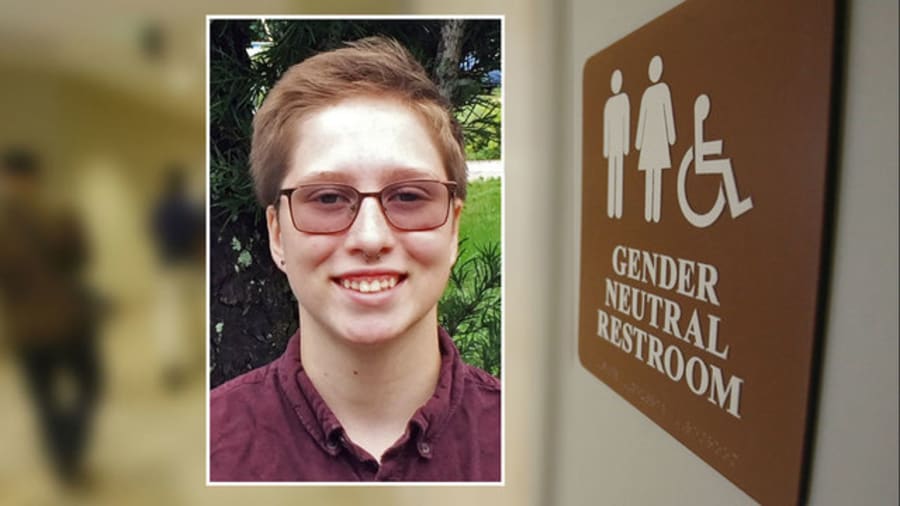TALLAHASSEE, Fla. – The St. Johns County School Board is asking a federal appeals court to again consider a years-long battle about whether a transgender male student should have been allowed to use boys’ bathrooms.
The Northeast Florida school district last week filed a motion for a rehearing after a divided panel of the 11th U.S. Circuit Court of Appeals in July said a policy preventing Drew Adams from using boys’ bathrooms was “arbitrary” and violated equal protection rights.
Recommended Videos
Adams was born a biological female but in eighth grade told his parents he was a transgender male, according to the July panel ruling. The lawsuit, which was filed in 2017, stemmed from Nease High School requiring Adams to use a gender-neutral, single-stall bathroom or girls’ bathrooms.

The panel, in a 2-1 decision, said the school district’s policy about bathroom use is arbitrary because it relies on information submitted when students enroll in the district, rather than on updated information. Adams enrolled in the district in fourth grade, with information listing him as a female, but he later obtained legal documents listing him as a male. He has graduated from Nease High School as the court fight has continued.
The panel said, in part, that the policy could lead to a transgender male being able to use boys’ bathrooms if he is listed as a male on enrollment information, while Adams was barred because his initial information listed him as female. The panel said the policy “runs afoul of the Fourteenth Amendment (guaranteeing equal protection) because it does not even succeed in treating all transgender students alike.”
“The school district gives no explanation for why a birth certificate provided at the time of enrollment takes priority over the same document provided at the time the bathroom policy is applied to the student,” said the July 14 ruling, written by Judge Beverly Martin and joined by Judge Jill Pryor. “And we have come up with no explanation of our own. Mr. Adams has a birth certificate and a driver’s license issued by the state of Florida stating that he is male. But the school district refuses to accept for the purposes of the bathroom policy Mr. Adams’s sex listed on those current government-issued documents.”
But attorneys for the school board last week asked for a rehearing by the panel or by the full Atlanta-based court, arguing that the panel ignored broader issues in the dispute.
“This case has always been about whether a definition of sex founded in the real and enduring biological differences between boys and girls substantially advances the important privacy interests of students to use the bathroom free from members of the opposite biological sex,” the motion said. “Yet, the court has not answered that question. The school board requests that the entire panel of this court do so.”
Also, the attorneys for the school board argued the panel’s decision was based on a “hypothetical” situation of transgender students being treated differently, based on when they submitted enrollment information.
“The actual policy here, while theoretically imperfect, is substantially related to student bathroom privacy,” the school board motion said. “Indeed, the policy perfectly classifies nearly every student in the district, as at the time of the trial, the board was aware of only 16 transgender students out of approximately 40,000. There is no evidence that even those students’ sex as denoted in their enrollment materials did not match their biological sex, and we know that was not the case with Adams. More importantly, the policy classifies all students on the basis of biological sex, without regard to gender identity.”
U.S. District Judge Timothy Corrigan ruled in favor of Adams in 2018, and the appellate panel upheld Corrigan’s ruling last year. But the panel issued a revised opinion in July that was narrower than its 2020 decision.
William Pryor, chief judge of the appeals court, wrote a lengthy dissent to the July decision, saying that the revised majority opinion “distorts the challenged policy in a brand-new way, and it invents a legal claim the parties never presented.”
“When shorn of misunderstandings of the school policy and the legal standards that govern sex-based classifications, this appeal is straightforward,” the chief judge wrote. “The school policy protects longstanding privacy interests inherent in using the bathroom, and it does so in an ancient and unremarkable way --- by separating bathrooms on the basis of sex. That policy is not unconstitutional.”
But in the majority opinion, Martin fired back at the dissent, writing that “this case is not about challenging sex-segregated bathrooms.”
“The policy turns solely on the information provided at the time of enrollment, and a transgender student who updates his documents prior to enrollment would not be barred from using the bathroom matching the sex on his legal documents,” Martin wrote. “This, of course, is in contrast to the treatment Mr. Adams received. Despite the dissent’s imagined parade of horribles, this opinion does not resolve any other issue of student privacy.”
- Print


